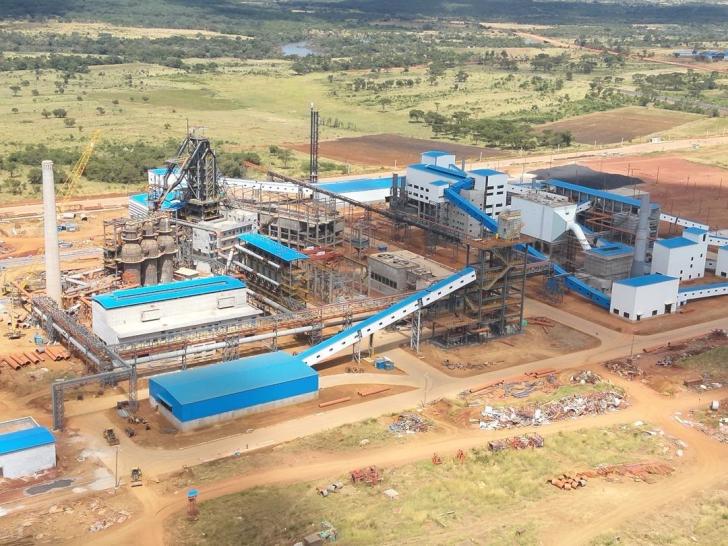News / National
Zimbabwe's steel revolution begins
17 Apr 2025 at 07:29hrs | Views

Zimbabwe has taken a major step toward economic transformation and self-sufficiency with the launch of full-scale finished steel production at the Dinson Iron and Steel Company (Disco) plant in Manhize. This marks a pivotal moment in the country's push to revive its iron and steel industry, reduce imports, and drive industrial growth.
The sprawling steelworks - one of the largest integrated facilities in Africa - is now producing finished steel products, including deformed bars in 16mm, 20mm, and 25mm sizes, designed for the local construction sector. With a current daily production capacity of 300 tonnes and an annual target of 600,000 tonnes, Zimbabwe is poised to significantly cut back on steel imports, which have previously cost the country nearly US$1 billion per year.
"This is a breakthrough for Zimbabwe," said Disco public relations manager, Mr Joseph Shoko. "We are now producing finished steel suitable for construction, and our products are more affordable than imported alternatives. This initiative will not only meet domestic demand but also position Zimbabwe as a regional supplier."
The Disco plant is a flagship investment under the Second Republic's pro-industrialisation and import substitution agenda. Owned by Tsingshan Holdings Group Limited - a global stainless steel giant - through its Zimbabwean subsidiary, Disco, the plant is part of a broader investment that includes Dinson Colliery in Hwange and the Afrochine Smelting ferrochrome facility in Selous.
Beyond steel output, the Manhize plant is proving to be a catalyst for local employment and infrastructure development. Approximately 2,000 jobs have already been created, with more expected as operations expand.
"The facility is a game-changer," said Mr Shoko. "It supports infrastructure development, boosts manufacturing, and helps diversify the economy beyond agriculture and mining."
To power its energy-intensive operations, Disco has built a 50-megawatt power plant, currently supplying around 24 megawatts. The company plans to contribute excess power to the national grid once regulatory requirements are met. A future wind power station is also in the pipeline, with a site in the Manhize Range already surveyed.
In keeping with global environmental standards, Disco has committed to sustainable practices, including reforestation. In collaboration with the Forestry Commission, the company planted 5,000 trees last year on National Tree Planting Day. It has also begun upgrading the 23-kilometre gravel road linking the plant to the highway, enhancing connectivity ahead of the plant's official commissioning later this year.
The long-term vision for Manhize goes beyond steel. Plans are underway for the development of a Smart City - Manhize Town - and a science university, further underscoring the transformative potential of the investment.
"What was once dense forest has become a beacon of industrial progress," said Mr Shoko. "Zimbabwe is now on course to become a major player in the global steel industry."
The successful launch of finished steel production at Disco sets the stage for a new industrial era in Zimbabwe - one defined by self-reliance, innovation, and regional leadership in manufacturing.
The sprawling steelworks - one of the largest integrated facilities in Africa - is now producing finished steel products, including deformed bars in 16mm, 20mm, and 25mm sizes, designed for the local construction sector. With a current daily production capacity of 300 tonnes and an annual target of 600,000 tonnes, Zimbabwe is poised to significantly cut back on steel imports, which have previously cost the country nearly US$1 billion per year.
"This is a breakthrough for Zimbabwe," said Disco public relations manager, Mr Joseph Shoko. "We are now producing finished steel suitable for construction, and our products are more affordable than imported alternatives. This initiative will not only meet domestic demand but also position Zimbabwe as a regional supplier."
The Disco plant is a flagship investment under the Second Republic's pro-industrialisation and import substitution agenda. Owned by Tsingshan Holdings Group Limited - a global stainless steel giant - through its Zimbabwean subsidiary, Disco, the plant is part of a broader investment that includes Dinson Colliery in Hwange and the Afrochine Smelting ferrochrome facility in Selous.
Beyond steel output, the Manhize plant is proving to be a catalyst for local employment and infrastructure development. Approximately 2,000 jobs have already been created, with more expected as operations expand.
To power its energy-intensive operations, Disco has built a 50-megawatt power plant, currently supplying around 24 megawatts. The company plans to contribute excess power to the national grid once regulatory requirements are met. A future wind power station is also in the pipeline, with a site in the Manhize Range already surveyed.
In keeping with global environmental standards, Disco has committed to sustainable practices, including reforestation. In collaboration with the Forestry Commission, the company planted 5,000 trees last year on National Tree Planting Day. It has also begun upgrading the 23-kilometre gravel road linking the plant to the highway, enhancing connectivity ahead of the plant's official commissioning later this year.
The long-term vision for Manhize goes beyond steel. Plans are underway for the development of a Smart City - Manhize Town - and a science university, further underscoring the transformative potential of the investment.
"What was once dense forest has become a beacon of industrial progress," said Mr Shoko. "Zimbabwe is now on course to become a major player in the global steel industry."
The successful launch of finished steel production at Disco sets the stage for a new industrial era in Zimbabwe - one defined by self-reliance, innovation, and regional leadership in manufacturing.
Source - The Herald


























